A Boy and His Dog
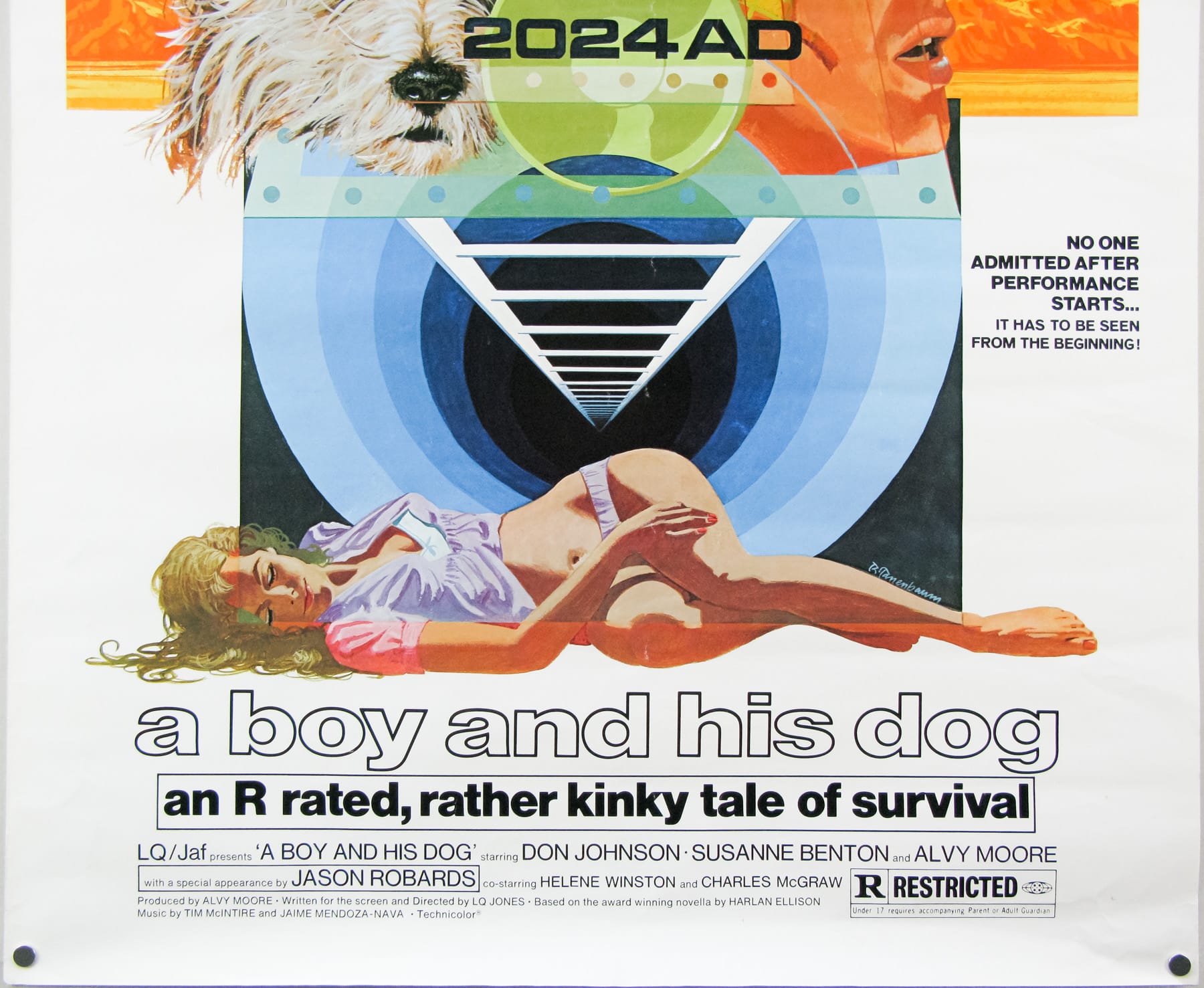
1975
I've never thought (or written) so much about a film I find both boring and abhorrent.
Trigger warning: Rape, sexual abuse.
And spoilers.
Whenever A Boy and His Dog came up conversationally, Dad would say underhandedly, "Ahh...interesting movie." He never encouraged us to watch it, though I don't think he ever encouraged us to watch any of his movies. When we were old enough, we certainly went to see the plays he was in.
In 2024, the year the film is set, I decided it was time to have a look at this movie. After viewing it, I now have a better understanding of why my dad found the film "interesting," and also why he never encouraged us to watch this one specifically. Yikes.
Interesting
The movie's depiction of life after a nuclear war is compelling, and has had an enormous influence on the visual concept and style of other post-nuclear dystopian films. Set in Phoenix, Arizona in 2024, after World War IV, the city exists only as piles of rubble in a vast desert.
It is a lawless, barbaric, "dog-eat-dog" place, where rape and pillage are the norm, men roaming in packs or alone, surviving on their most brutal skills and instincts. Women are few and far between, and are explicitly hunted as sexual prey. The protagonist, Vic, has grown up in this wasteland, and he has a dog, Blood, who is his companion and teacher. Blood has some amazing skills: he is highly intelligent and educated, he can telepathically communicate with Vic, and he can sense and track women. Isn't man's best friend amazing?
This wild, inhospitable surface is contrasted with a closed underground civilization of "law and order," with plentiful food, wholesome picnics and parades, church, and safety from the barbarism on the surface, despite perennial darkness. However, The Downunder or "Topeka" is in fact its own dystopia, of the totalitarian kind. My dad plays Lou Craddock, a leader of The Committee, who never hesitates to send folks to "The Farm" for the slightest infraction.
Yes, they are really WHITE. And clownish. Subtle.
Ah, The Farm. We eventually learn that The Farm is not a place at all, but death by some form or another. My dad used to call the little private school we went to "The Farm," and now, 40-some years later, I get the joke. (Hopefully The Farm of A Boy and His Dog is not predictive of RFK Jr's proposed "wellness farms" for folks with drug addictions, neurodivergence, chronic illness – or whatever he sees as farm-worthy.)
I do enjoy that this bizarre underground bunker of clownish white people, 1950's parades and religious "morality" is called "Topeka" – but we're not in Kansas anymore. They'll kill you if you disobey. Of course, the movie's plot is a collision course between barbaric Vic of the surface and the controlling society of the Downunder.
A Boy and His Dog was shot on a shoestring budget over a few years (yes, years), with director L.Q. Jones scraping together funding on the fly, initially using some of his own money. This was L.Q.'s first and only directing project, and he also ended up writing most of the screenplay when author Harlan Ellison developed writer's block. For whatever reason, L.Q. believed in this story.
BOY was shot in various Southern California locations, where I expect most of the cast and crew could live at home in the LA area instead of the production paying for lodging. Locations include Coyote Dry Lake, Arroyo Verde Park, and the Goldstone Deep Space Communications center, all within 2 hours' drive of LA. This was perhaps a no-brainer for director Jones, who had shot myriad westerns for TV and film in the California desert.
Additionally, I suspect the tiny budget made it necessary to use relatively barren desert as the remnants of the city of Phoenix, with very limited actual city ruins. This is a departure from the original story, in which the ruins of Phoenix were more elaborate.
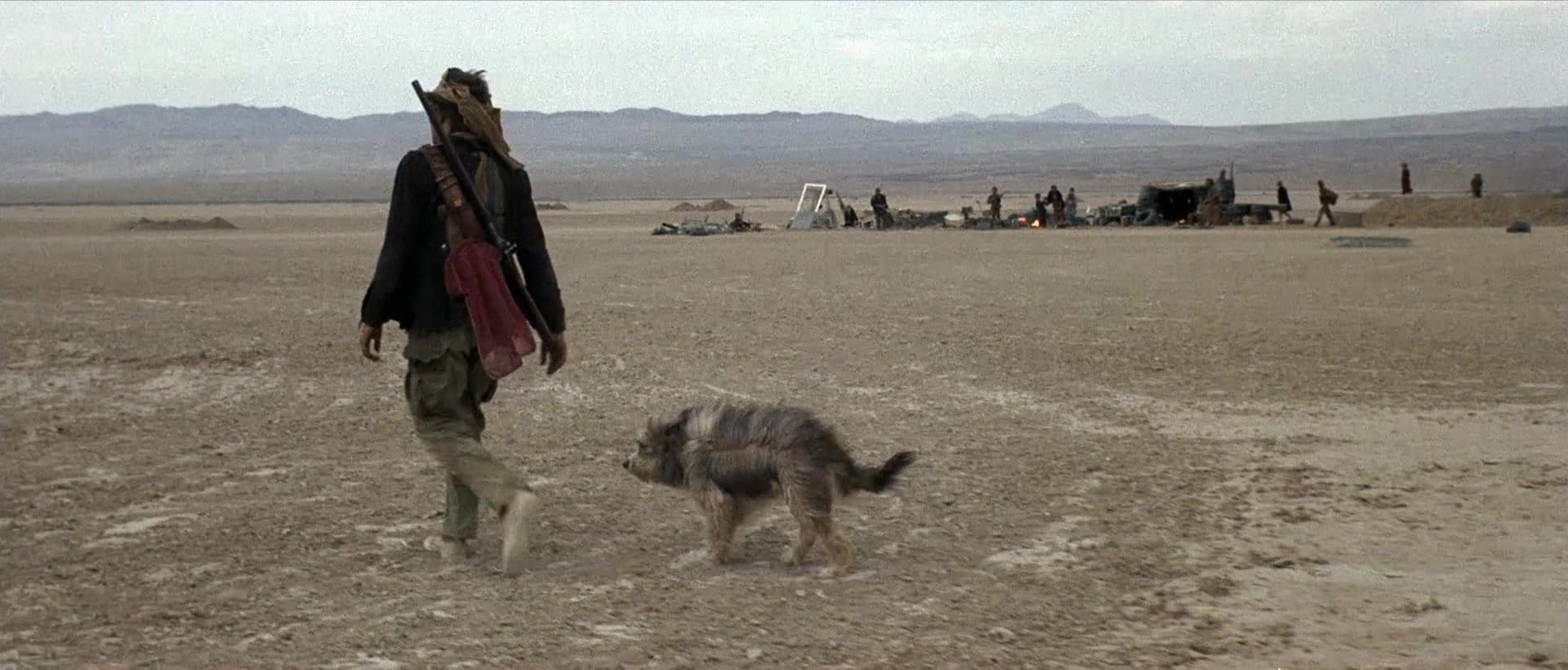
Until reasonably realistic high-resolution CGI (Computer Graphic Imagery) was developed, it was technically near-impossible and far too expensive to build urban ruins the likes of which we see in 12 Monkeys, Terminator, or pick your Roland Emmerich film. (And make no mistake, elaborate CG ruins are expensive, too.)
So, the confluence of author Ellison's vision with the limitations of an ultra-low-budget movie serendipitously inspired an entire DVD shelf of desertified post-apocalypse dystopias with a "civilized" underground. A Boy and His Dog was clearly influential for The Road Warrior/Mad Max films according to their director, George Miller. Also the Fallout video games and show, the TV series Silo and others.
And as Debbie Allen says, "out of limitation comes creativity." To me, the ingenuity of the filmmaking team to create a credible cinematic world within their budget limits remains the most interesting and enduring achievement of this film.
Please jump to "At Home" if you are feeling disturbed or want to avoid the aforementioned triggers. The movie is not worth it.
The Yikes
Beyond the interesting scenario, I don't find the plot or characters very original and much of it is cringeworthy. This is a light-hearted rape-fantasy film, masquerading as an unflinching look into man's "true" nature and a possible dark future of our civilization. It's also slow, boring and nauseating if you don't enjoy rape humor or the most tired tropes of cinema.
And here come a few spoilers.
What is this? Satire?
Because I was dumbstruck by the awfulness of this film, I turned to the internet to get a toehold on what I was looking at. I found that it's a divisive movie, and few don't feel strongly about it one way or another – it's a love or hate thing.
Joanna Russ (a friend of Ellison's and fellow sci-fi author) wrote:
Early in BOY Vic finds a woman raped and [nearly] murdered by a roverpack and comments on what a waste the murder was; she might've been good for a few more times. But by the end of the film the only logical attitude he (or we) can adopt—the whole film has been devoted to proving this point—is that Vic was wrong: the only good woman is a dead woman and the only way a man can have sex with a woman safely is to kill her afterwards. This morality is the morality of King Shahriyar, and while The Thousand and One Nights presents this morality as insane, BOY presents it as exemplary, perhaps even heroic.
Suffice it to say, Russ was not a fan of the movie. This early scene Russ mentions sickened me and turned me against the film early on. I tried to keep an open mind, but it was difficult, especially because it was boring.
On the other hand, C. Robert Cargill, of the Junkfood Cinema podcast, adores this movie. He over and over calls this film "satire" while belly-laughing at the madness of the boy essentially having a "rape-dog" who is the more civilized of the two. Cargill doesn't seem to find this horrific, but darkly funny, and seems to enjoy that the original author Harlan Ellison is a "gonzo," "out-there" writer. Hmm. I didn't feel the satire. So I fact-checked myself.
Professor Evan Gottlieb writes, "Satire is the art of making someone or something look ridiculous, raising laughter in order to humble, or discredit its target." Additionally:
Satire also depends on the audience recognizing it as such: for satire to be effective, it must be received as satire – there is always the risk that the satire will be read “straight” or superficially.
I guess the plot of a fellow looking for women to rape didn't "raise laughter" for me. I didn't find the desolate surface ridiculous but kind of awful and ominous. I can certainly see a few satirical elements, especially in Topeka, but it doesn't add up. The tone is rarely satirical – compare it with Brazil or Twin Peaks, both of which I "received" as dark satire. I don't see A Boy and His Dog in any way ridiculing the main character's actions, rather I sense the filmmakers enjoying the ride of this barbaric young man's misadventures.
The basic white rebel
Despite the unusual setting and details, the plot itself is pretty basic – young attractive rebel-hero outsmarts confining stodgy society – a plot line as old as Charlie Chaplin (whose satires I prefer). Throw in a little subplot of man tricked by a seductive woman but gets wise in the end and that's about it. No surprises here. And a bit dull in the pacing as well.
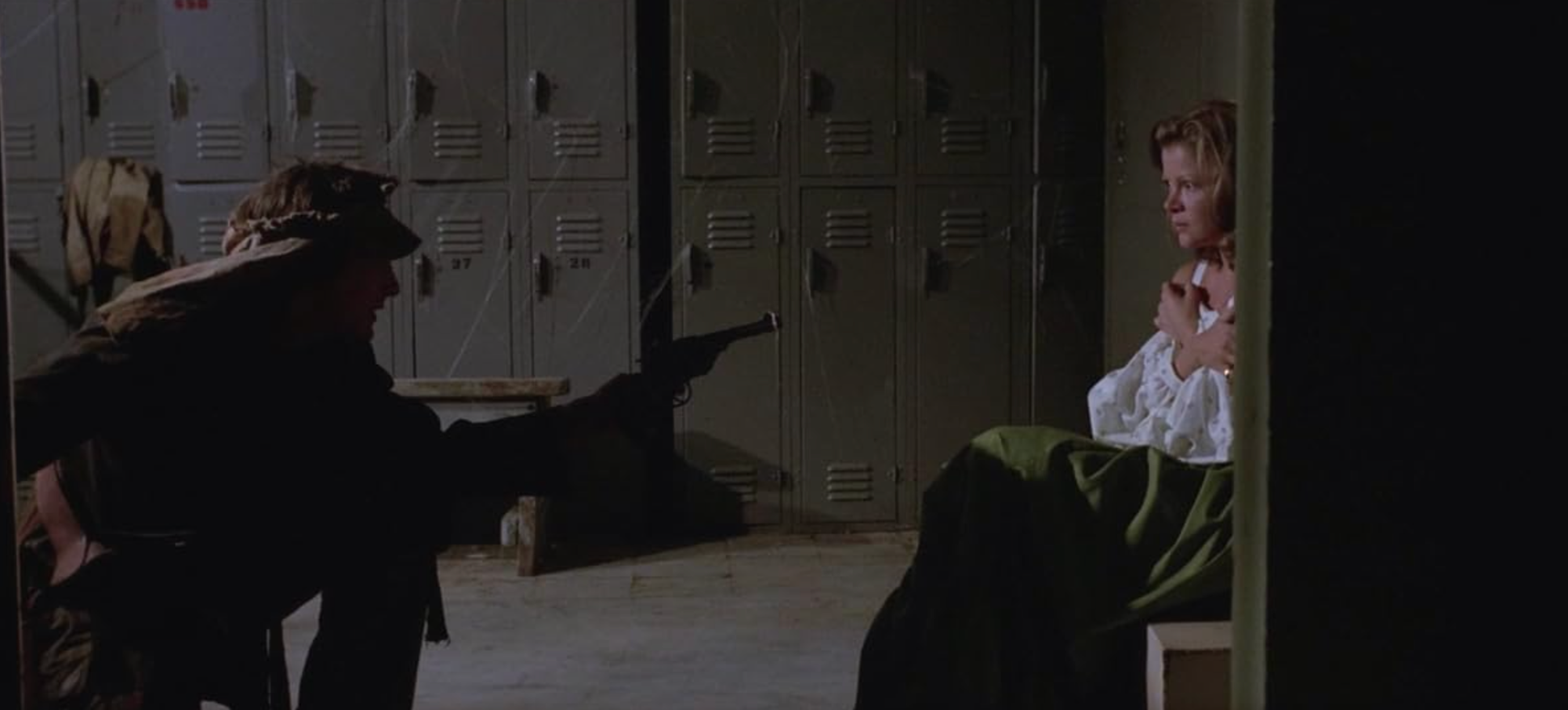
I also see A Boy and His Dog as a western in sci-fi costume. L.Q. Jones, the director of BOY, was a regular actor in Peckinpah films and Wild West shows and was steeped in the cowboy mythology. Many of these westerns lionized violence by the "good guys" even if it was outside the law, and poked fun at the stodgy, sheltered people of society. The wasteland in BOY is very Wild West – lawless, violent, inhospitable to gentlefolk and women. Only tough guys survive by their gunslinging. Survival and laying a broad is all there is. Except in BOY, the big twist is that one genius dog.
As Vic, the young Don Johnson, later of Miami Vice fame, is appealing and oddly clean for roaming the desert wasteland his entire life.
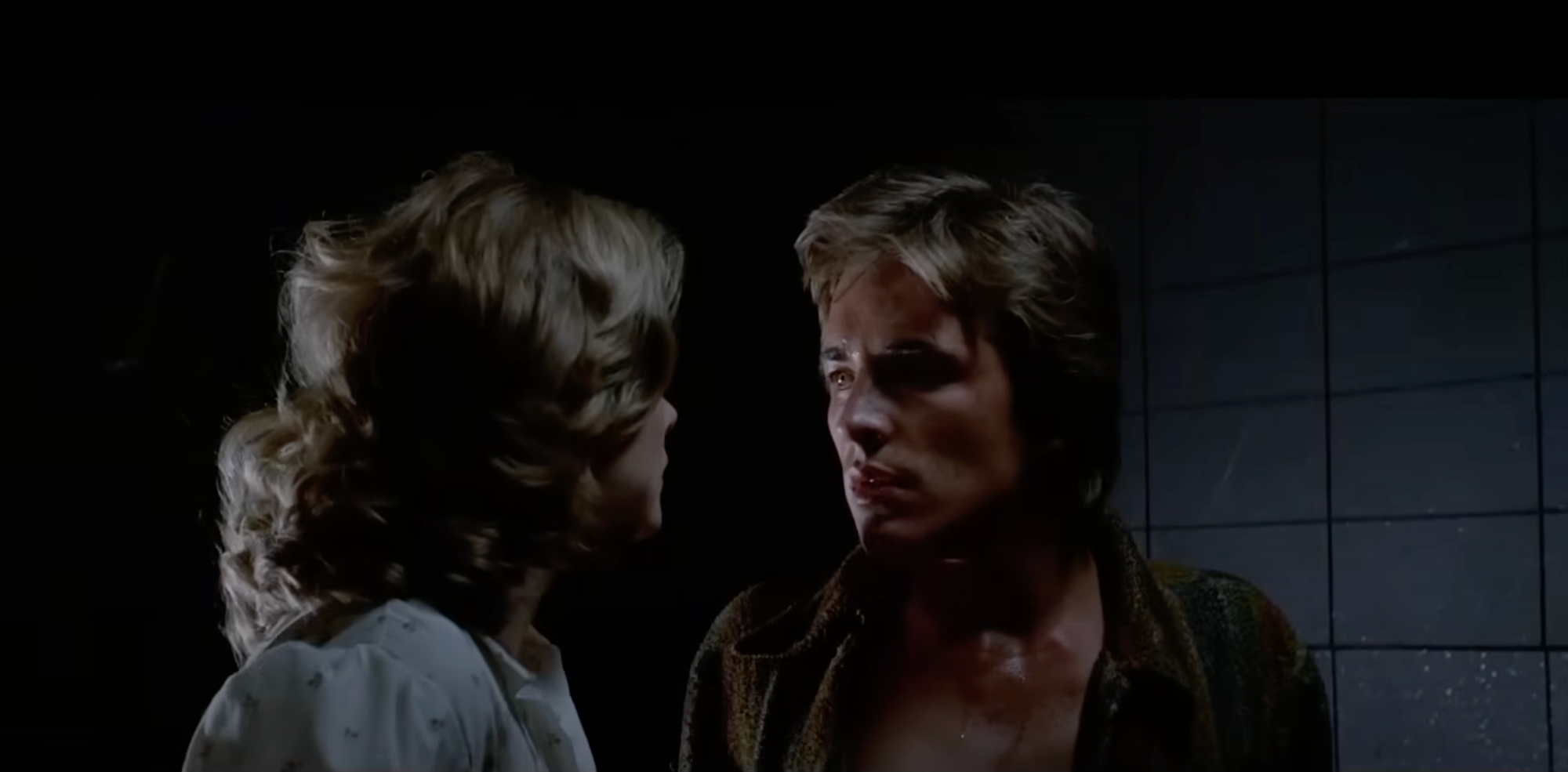
The photography of his "interest" Quilla June is very typical male-gaze camerawork, not indicating any critique of this point-of-view, just basic delight. Somehow Quilla spends most of her initial screen time with either no pants or no top (or both).
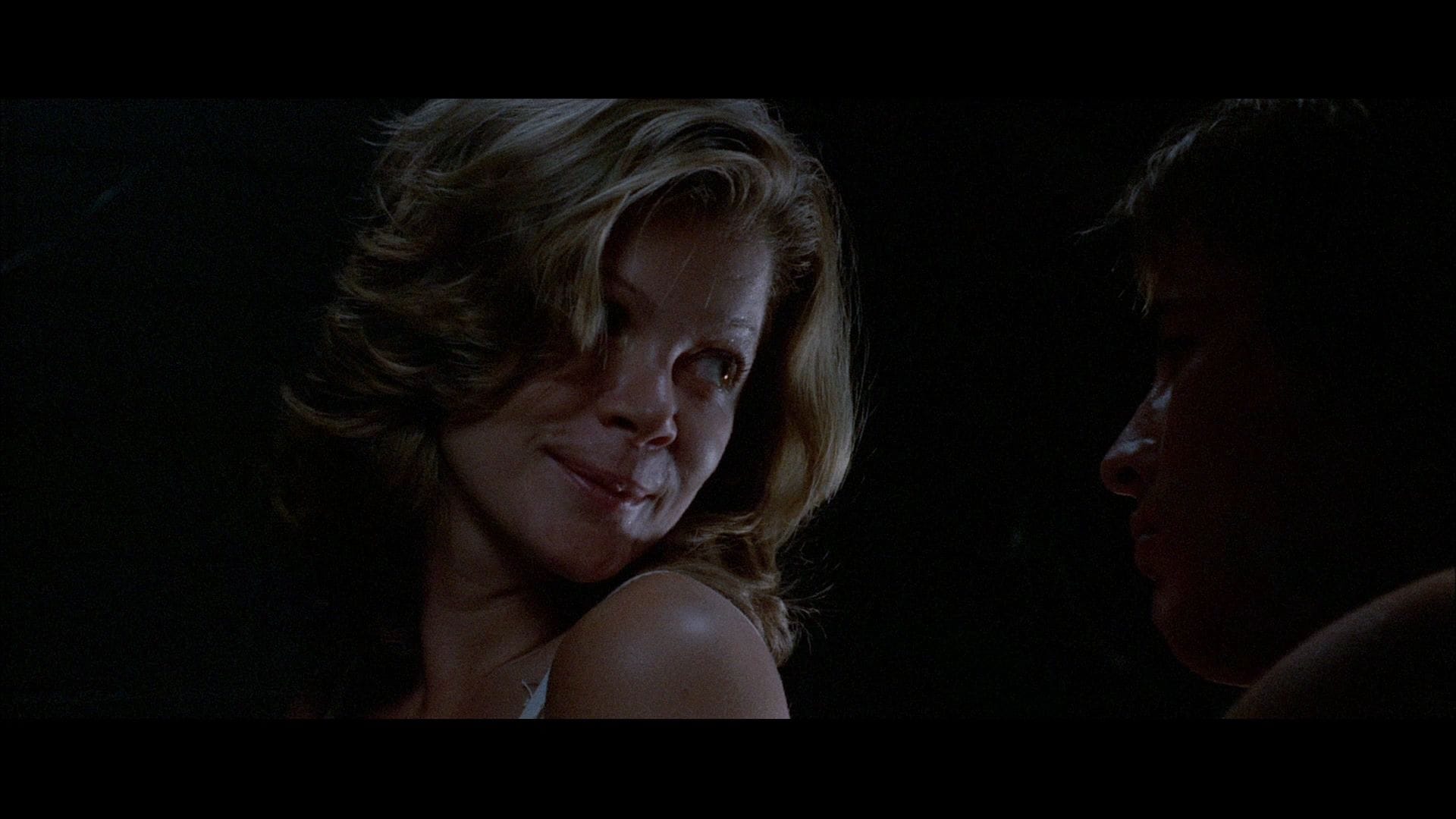
Vic captures Quilla, intending to rape her. When the moment comes, she suddenly seems to want sex, and then she wants more! And more! Can you feel my eyes rolling? Are yours? The sick and tired fantasy of a woman enjoying rape. Really. It's not played for laughs, rather the laughs are cued at Blood's wry disappointment at Vic's growing attachment to Quilla. A threat to male cameraderie. A threat to their survival.
The unfunny reality
The movie ends on a joke about a woman's taste – as dog food.
Why do I find this last line, and this whole movie, so very unfunny? The other day I was listening to Rebecca Solnit's memoir, Recollections of My Nonexistence, and she provided a little more insight for me, in a way that only Ms. Solnit can:
In the arts, the torture and death of a beautiful woman or a young woman or both was forever being portrayed as erotic, exciting, satisfying....Legions of women were being killed in movies, in songs, in novels, and in the world, and each death was a little wound, a little weight, a little message that it could have been me.
Could have been. Most women have personally experienced the threat of male violence, if not actual violence. According to the CDC, more than half of all women have experienced some form of sexual violence in their lifetimes, and 1 in 3 have been publicly harassed. I have memories that bring up stress in my body right now, "indelible in the hippocampus." Male violence, even if most men don't commit it, is a constant and real threat to women, a threat reinforced by art, entertainment, true-crime shows, online porn, the news, and walks down the street.
So is it surprising that this type of humor is unfunny to many women? Joanna Russ finishes her essay thus:
"Must I proclaim publicly right here that sending a woman to see A BOY AND HIS DOG is like sending a Jew to a movie that glorifies Dachau; you need not be a feminist to loathe this film."
The charade of critique
I have a little theory, probably not original to me, that I expect to explore with several of the movies my dad was in – the Peckinpah movies, the westerns, the Al Capone one, some others I'm sure.
So often, films that purportedly criticize extra-ordinary masculine brutality also subliminally or accidentally glorify that same behavior.
Sometimes the violence and misogyny are intentionally glorified and criticized at the same time.
Is this really a clever dialectic that deserves endless accolades and rehashes?
Regardless, it is a choice that is so common in the "great directors'" canon: Alfred Hitchcock, Sam Peckinpah, Martin Scorsese, Sergio Leone, Quentin Tarantino, David Lynch, to just scratch the surface. Directors that I grew up admiring, and still do in certain ways.
In terms of quality, BOY is far from Rear Window or Once Upon a Time in the West, but it shares that fascination with extra-ordinary male violence, misogyny and general misbehavior.
Some commentators say that the story and film are a critique of the late-60s early-70s culture. If I squint I can see this: civilization (mainstream US politics and people) had their figurative "head in the sand" about the barbarity of the Vietnam war, and "the civilized" were perhaps more amoral in their pursuit of the war and violent quashing of dissent and civil rights than the young generation, who wanted peace and love and rock 'n' roll. It's a stretch, because the main free-spirited character in this film is a rapist who possesses no personal philosophy or ethics whatsoever. Perhaps the author intended a misanthropic take on humanity, but the film doesn't make it there. Don Johnson is perhaps too charming.
I would send this movie to The Farm, immediately.
For some truly insightful dystopian near-future fiction, I recommend Parable of the Sower by Octavia Butler. If you prefer to watch, check out A Handmaid's Tale, from a book by Margaret Atwood. Both of these works have much more insight into male behavior, patriarchy, control, religion – and include woman's quest for sovereignty. And how about sci-fi with a positive vision of something beyond patriarchy? Try Ursula K. LeGuin.
At home
I believe this was Dad's first film after The Accident, shot in 1973 or 1974. He considers All the President's Men his first major film after The Accident, perhaps because it was his first sober film. (Yes, even after a near-death drunken car accident, my dad didn't totally quit drinking. More on that another time.)
I have a hunch that director L.Q. Jones, who was a friend from the Peckinpah movies, cast Dad as a favor, or maybe the other way around – Dad did a favor for L.Q., because the pay couldn't have been much.
Regardless, I think they needed each other at that time.
Dad had to get back to work, and L.Q. needed a name. "Jason Robards" was still considered a major talent, but it was uncertain if he would be able to continue to act, or if he had cleaned up his act, as his alcoholic misadventures were well-known in Hollywood and New York.
So, he did the movie. A small part, probably only a few days' shooting for him.
I really wonder what Dad thought of the movie as a whole, and specifically the clown makeup. It cracks me up to see him wearing his actual reading glasses with that makeup and in such a bizarre scenario, muttering his lines with a weary naturalism that contrasts with the very unnatural makeup. He plays it like the brutality of Craddock's job is so boring at this point. The banality of evil?
And what on earth did my mom think, sending her husband off to film this script? She was presumably at home with me, a baby just over a year old. I guess she could handle Peckinpah (he was their best man after all), so what’s the big deal about a cheap sci-fi twist on a Peckinpah flick?
But this is a movie that I would love to ask my parents: WHY?
I have so few pictures or clues from 1973. I’m sure we were living in Malibu, in the “Miller” house. A rental. These were lean and uncertain times for my parents. No consistent work, a bad reputation, alcohol still an issue, alimony and palimony payments constant.
I came across a few pictures of my dad at the Malibu house with a fellow unknown to me. Maybe it was his agent, Peter Witt, or a producer from A Boy and His Dog? Am I reading too much that I see some uncertainty here in his face, and this conversation feels more like a casual business meeting than a friendly hangout? Why did my mom take pictures through the window? I wish I could ask her.
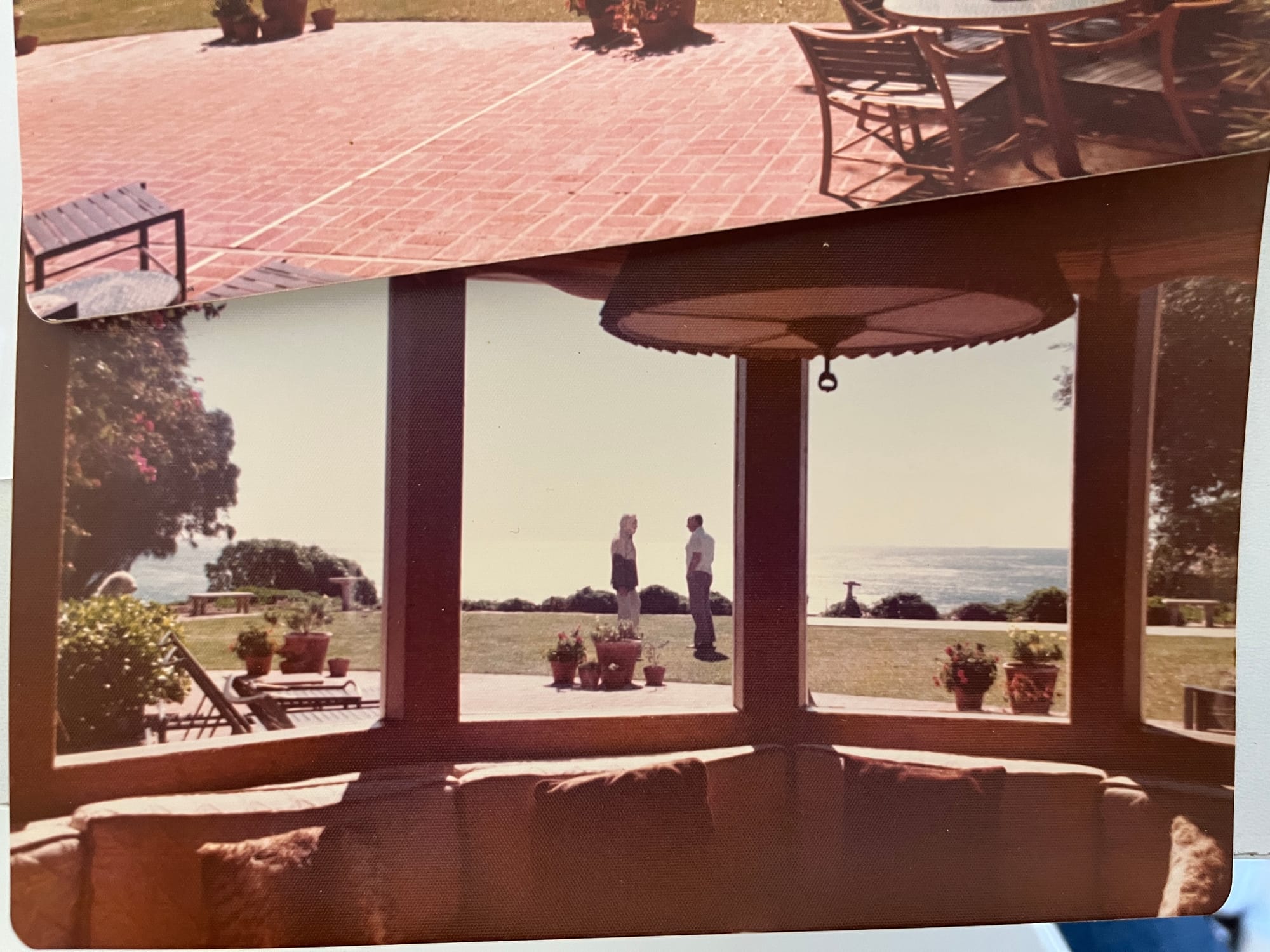
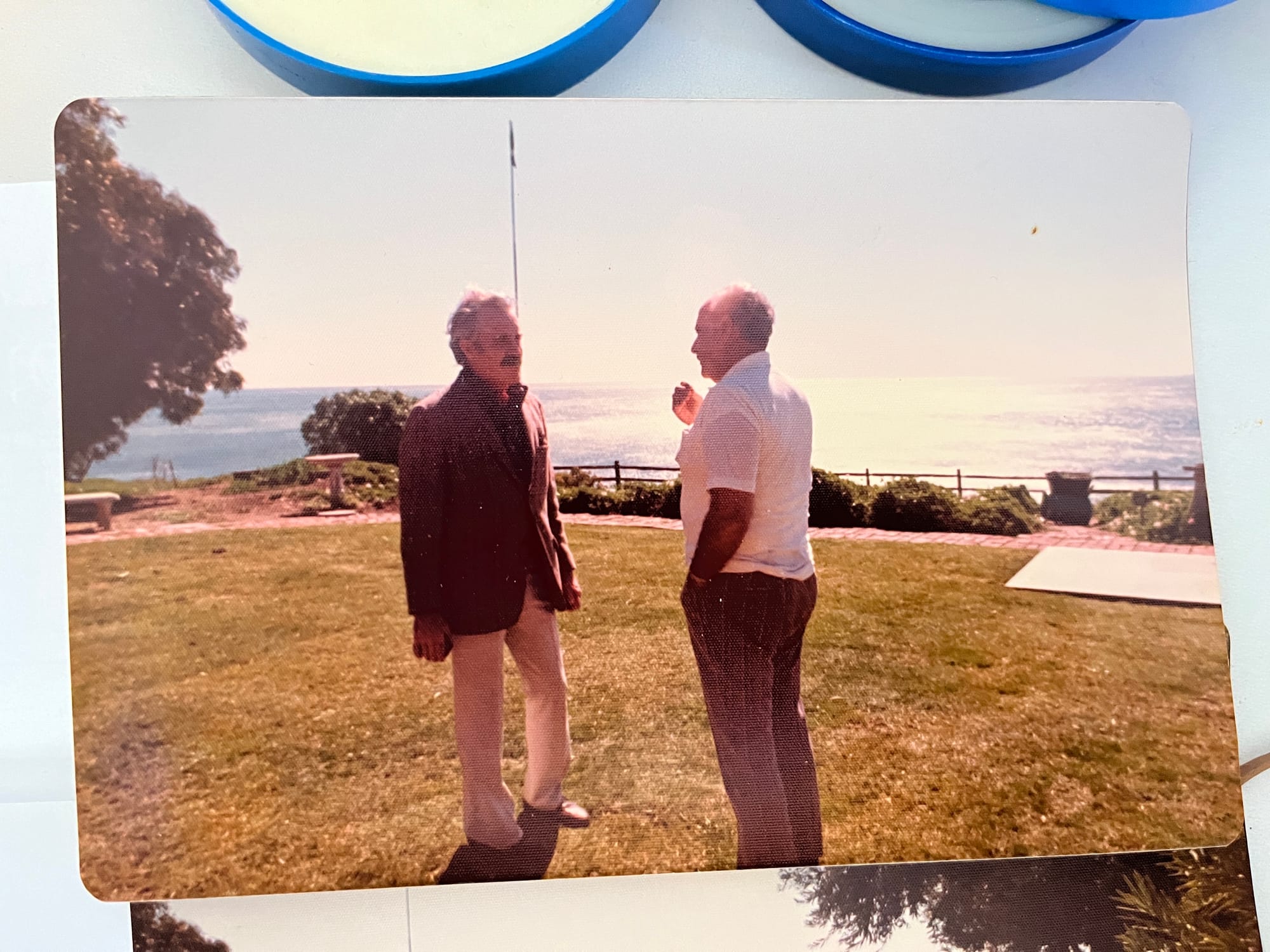
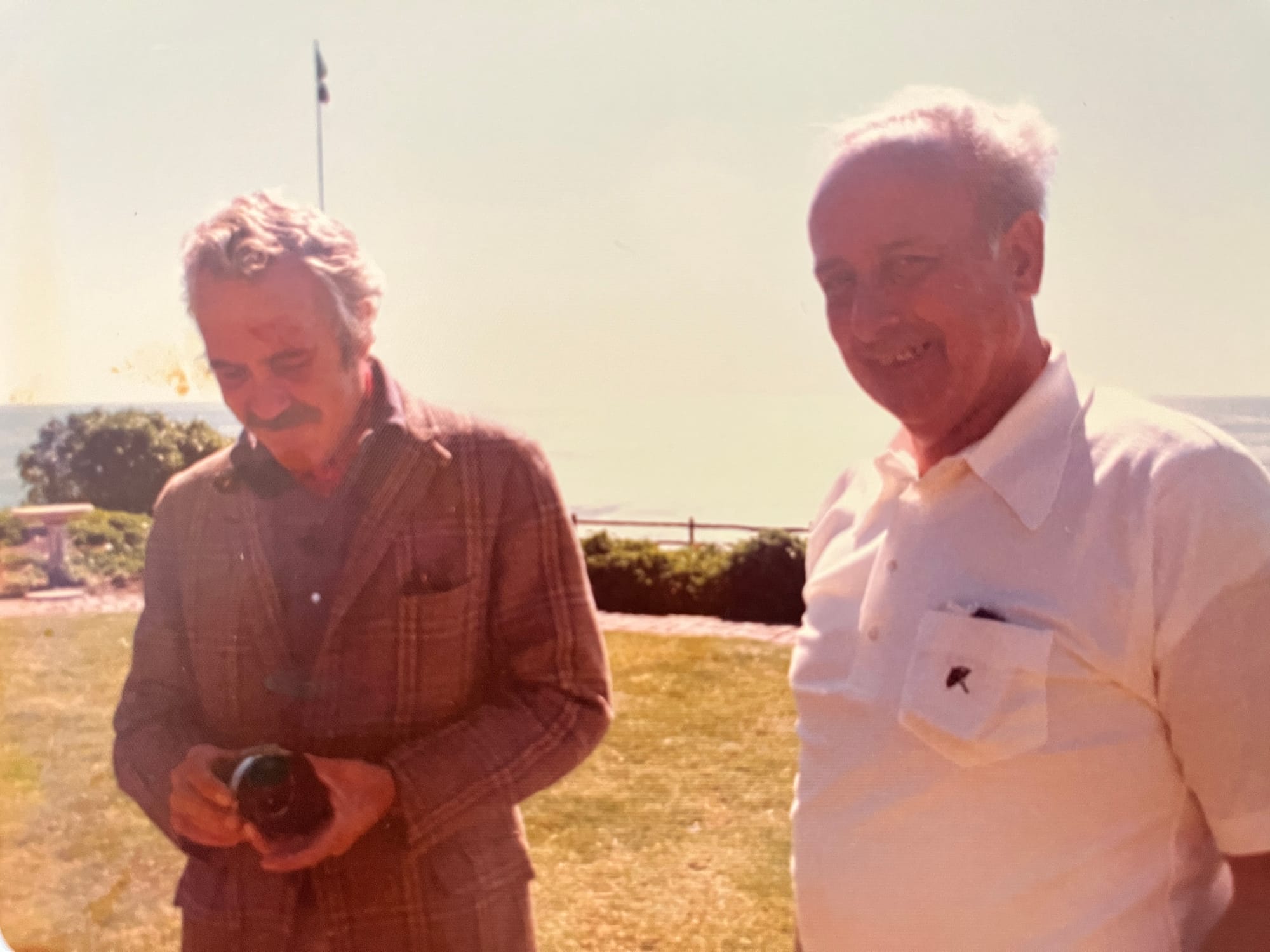
I surmise A Boy and His Dog was one small way for my dad to simply get back to work, to see if he could do it. It certainly wasn't a prestige film. And I doubt it paid many bills, either up front or on the back end. A Boy and His Dog didn't achieve cult status until many years later, probably by the time he and Don Johnson were shooting The Long Hot Summer in 1984. I wonder if they talked about A Boy and His Dog!
Connections:
Don Johnson: The Long Hot Summer (1985)
L.Q. Jones: Pat Garrett and Billy the Kid (1973), Ballad of Cable Hogue (1970)
Then/Now:
- Malibu, where we lived, and Arroyo Verde Park, where many of the "Topeka" exteriors were filmed, have endured tragic wildfires in recent years. Every Malibu house we lived in during the 1970s is gone from wildfires, and I suspect the 2025 Palisades Fire consumed some of those rebuilds. In fact, Malibu is the wildfire capital of North America, and it was completely burned over at least twice in the 20th century. Wildfires are an ecological fact in this area, far pre-dating White settlement.
- The Chumash, the original people of the Malibu/Oxnard region (and beyond), used planned (prescribed) burning to enhance crops and wildflowers. These planned burns also prevented the giant wildfires that the area now endures because fire is prevented for so long. Some areas of Southern California are experimenting with restoring the land with these ancient techniques of tending the land:
- Coyote Dry Lake, where the wasteland was filmed, was in fact once a lake, perhaps 15,000 years ago. How do we know this? Fossilized remains of critters like fish and plants that only lived in lake environments have been discovered. If you're interested in learning more, please read on in this fascinating article which details all the lakes of the ancient Mojave River region. Yes, before there was the Mojave Desert, there was the Mojave River!
- This centurty, the entire Southern California region is experiencing significant average temperature increase of more than 2.5˚F, and all its downstream climate impacts. The desert faces particular threats:
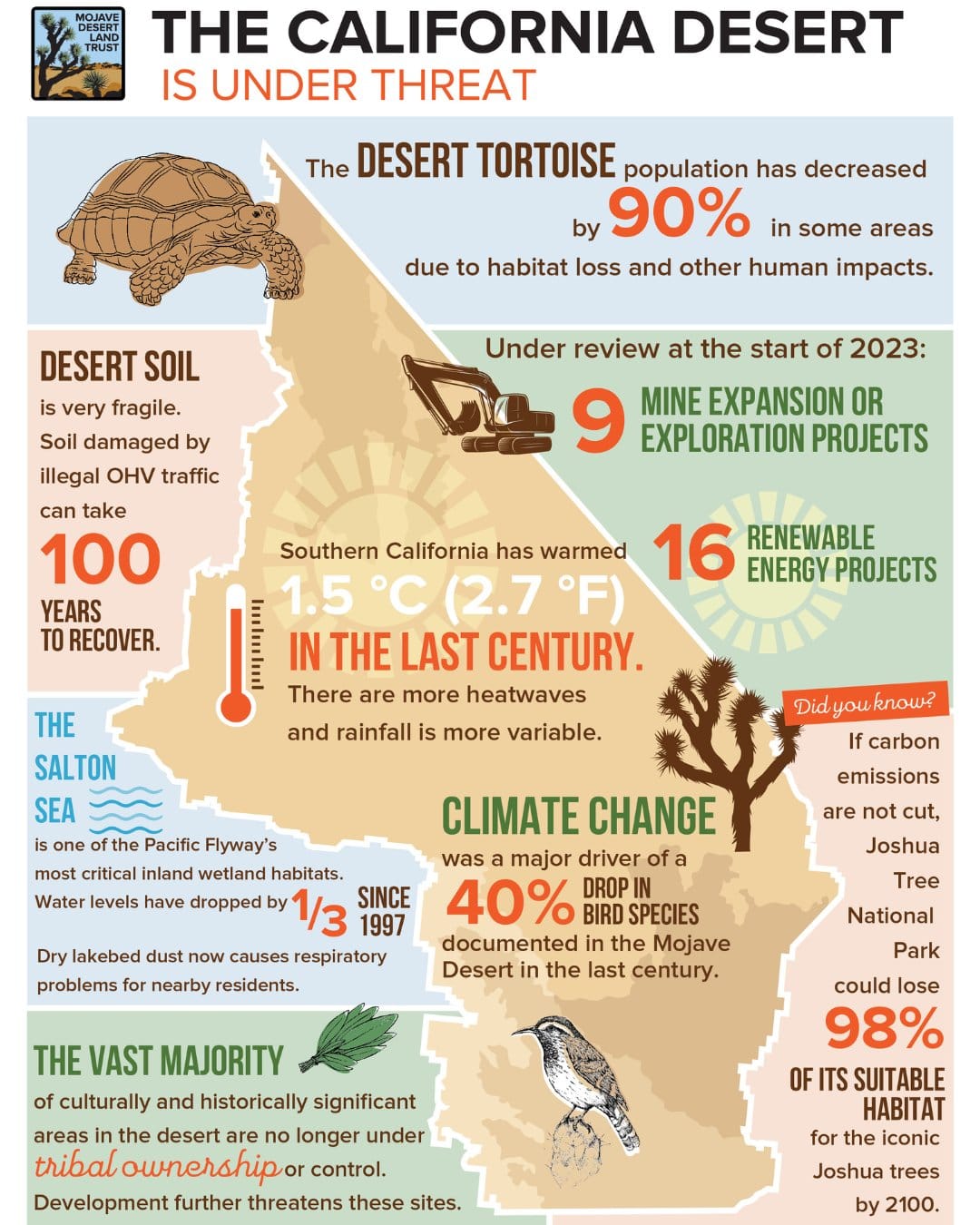
P.S. I feel a little pang of guilt by association reading that the Desert Tortoise is endangered. On some film out in the desert, my parents brought back a Desert Tortoise and made it our pet. His name was Bardolf. He was big enough that I could sit on him as a little toddler. Apparently he liked strawberries and ran off into the bushes with his "girlfriend" Neil, never to be seen again. In our family, Bardolf was an amusing anecdote. Things were different in the 70s.